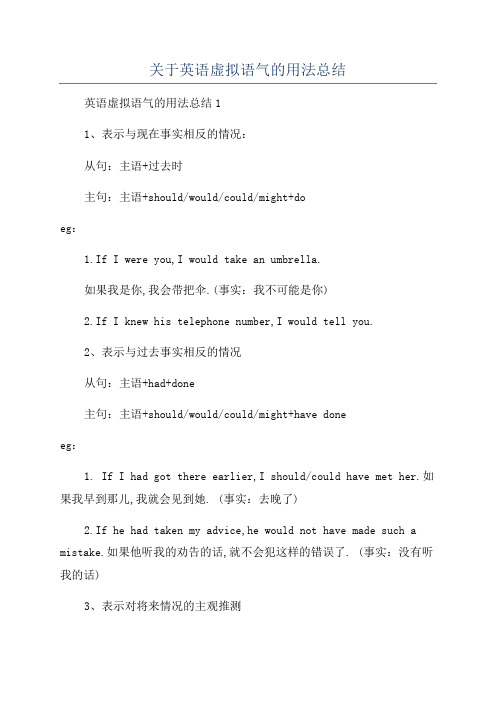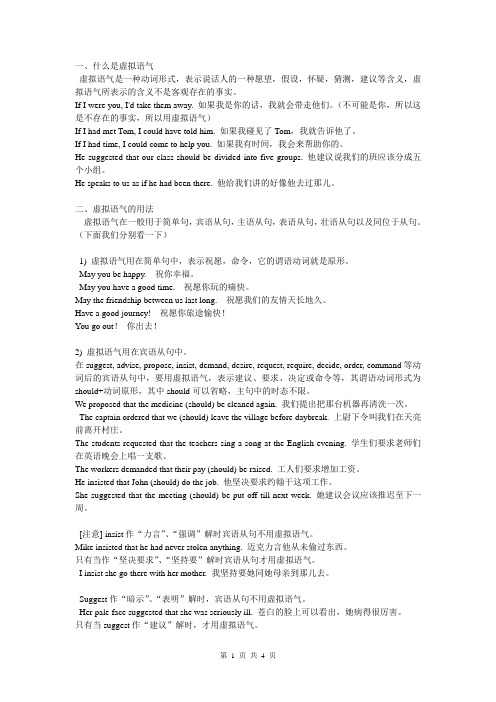虚拟语气的几点特殊用法
虚拟语气

虚拟语气一、I f引导的条件从句主句从句1、现在would +动词原形一般过去时/were2、将来would +动词原形were to +动词原形/ should +动词原形3、过去would +现在完成时过去完成时Examples:1.If I had time, I would go now.2.If it were to/should snow here tomorrow, we would stay at home.3.If you had studied hard, you would have passed the examination.必须注意如下几点:1. 主句中的would 可换成could(能够/会)might(可能/也许)If I had listened to my father, I might have finished the job in time.2. 混合型的虚拟语气(主句与从句的时间不一致)If you had listened to me, you would be a teacher now.倒装句:当省略if 时,should/were/had 提到主语的前面构成倒装句。
If I had earned enough money, I would have bought a car.--------Had I earned enough money, I would have bought a car.If it were to rain tomorrow, I would not go there.--------Were it to rain tomorrow, I would not go there用其他词或词组来代替if 表示条件without:如果没有/如果不but for:要不是only that/ but that(要不是)otherwise1)But for your help, I would not have succeeded.2)I would go with you only that I am too busy.3)She would have helped us but that she was short of money at that time.4)I am very busy now, otherwise I would go there with you.5)I was very busy yesterday, otherwise I would have gone there with you.二、某些动词后的宾语从句形式:(should)+ do 或(should) + be done建议suggest/propose/advise 命令order/ command要求ask/require/demand/request希望desire坚持insist其他agree/ decide/ determine/ prefer/ urge/ argue/ arrange/ beg/ pray/ prefer/ recommend Example:He suggested that we (should )hand in our homework quickly.He suggested that our homework (should)be handed in quickly.相应的过去分词、名词形式也要用虚拟语气1)Bill suggested that everyone should have a map.(宾语从句)2)It was suggested that everyone should have a map. (主语从句)3)It was Bill’s suggestion that everyone should have a map.(同位语从句)4)His suggestion was that everyone should have a map.(表语从句)5)We are going to discuss his suggestion that everyone should have a map.(同位语从句)三、It is/was + adj. + that……… 形式:should + do/ be doneIt is important that everyone should obey the law.形容词:anxious/ appropriate/ desirable/ eager/ essential/ impossible/ important/ incredible/ insistent/ natural/ necessary/ proper/ possible/ urgent/ vital/ willing四、在lest/ for fear that(惟恐)引导的从句中形式: should+ do/ be doneHe didn’t dare to go out lest someone should recognize him.He didn’t dare to go out lest he sh ould be recognized by the others.五、w ish后的宾语从句1.与现在或将来的愿望相反形式:一般过去时I wish I knew his address./ I wish I could help you.2.与过去的愿望相反形式:过去完时I wish you had written to him.补充内容:1.I wished that I knew his address.2.wish that + would doa. 对现状不满或希望将来有所改变I wish that you would answer my question. I wish the price of the petrel would come down.b. 一种请求I wish you would help me.注意:hope后不用虚拟语气形式六、If only要是……该多好!If only I were a girl.If only I had learned Russian before.七、W ould rather/ would as soon/ would sooner/ had rather 宁愿1.would rather sb. did………2.would rather sb. had done……..Examples:1)I would rather you were a girl. 2)I would rather you had told me the truth.比较:would rather ……. than…….. I would rather die than marry her.I would rather to have gone with you last night. I would rather to have gone with you last night.八、a s if/ as though的从句中He talks as if he knew the answer. He acts as if nothing had happened.比较:He walked here and there,as if looking for something.He opened his mouth as if to say something.九、It is time/ It is about time/ It is high time +sb did该是…….时候了It is time you went to school. It is high time we left for Beijing. 比较:It is time for me to do the job. It is time I did the job.It is the first time I have seen the film十、其他用法1)表示祝愿等(多用动词原形)God damn it!Long live Chairman Mao!So be it.(就这样吧。
完整版)虚拟语气用法归纳

完整版)虚拟语气用法归纳虚拟语气是动词的一种形式,表示说话人对某一行为或事情的看法和态度。
语气的种类包括陈述语气、祈使语气和虚拟语气。
陈述语气用于陈述句、疑问句和某些感叹句,表示动作或状态是现实的、确定的或符合事实的。
例如:“XXX.”,“XXX?”和“How good a teacher she is!”祈使语气表示说话人对对方的请求或命令。
例如:“Never be XXX!”和“Don’t et to turn off the light.”虚拟语气表示动作或状态不是客观存在的事实,而是说话人的主观愿望、假设或推测等。
例如:“If I were a bird。
I could fly in the air.”,“I wish I could pass the XXX.”和“May you succeed!”在简单句中,虚拟语气常用于情态动词的过去式用于现在时态时,表示说话人的谦虚、客气、有礼貌、或委婉的语气,常用于日常会话中。
例如:“XXX to show me the way to the post office?”和“It would be better for you not to stay up too late.”虚拟语气还可以用于表达祝愿,常用“may+动词原形”表示。
例如:“May good luck be yours!”,“May you be happy!”和“May you do even better!”。
还可以用于表达愿望和建议。
例如:“If only XXX.”和“XXX.”如果我现在有时间,我会和他们一起去。
(陈述语气)如果我现在是你,我就会和他们一起去。
(虚拟语气)与过去事实相反:若与过去事实相反,条件从句的谓语用过去完成时(be动词用had been),主句谓语用“should (would。
could。
might)+have+过去分词”。
如:如果我昨天有时间,我就和他们一起去了。
虚拟语气讲解整理

c. wasn’t killed killed
d. would not have been
2.虚拟语气的省略
在条件句中,可省略 if,把were ,had, should 提到 句首,变为倒装句式. If I were at school again, I would study harder.
Were I at school again, I would study harder.
ou would be a college student now.
如果你努力学习的话,你现在就会是大学生 了.
The Subjunctive Mood 典型例题
4. Jean doesn’t want to work right away because she thinks that if she ______ a job she probably wouldn’t be able to see her friends very often.
My idea is that we (should ) think it over before accepting it.
My suggestion that we (should) have a meeting has been accepted by others.
We all agree to that suggestion that the meeting (should) be put off.
2. If only 引导的感叹句(要是...该有多好啊) 表示现在的情况,应用过去式; 如果是过去的情况, 应用过去完成时态
If only I knew the answer!
If only I had seen the film yesterday!
虚拟语气用法详解

虚拟语气语气(mood)也是动词的一种形式变化。
这和中文中的语气是不一样的。
它表示说话者对所指的动词或状态所持的态度,而且,在谓语动词上有所体现,而中文没有体现。
语气可分为三种:陈述语气、祈使语气和虚拟语气。
虚拟语气(the Subjunctive Mood)表示说的话不是事实,或者是不可能发生的情况,而是一种愿望、建议或与事实相反的假设等。
一、虚拟条件句1.主句和从句都与现在事实相反时,从句用一般过去时,be的形式要用were,主句用would/could/ should/might+不定式一般式。
If I were you, I should not go with him.2.主句和从句都与过去事实相反时,从句用过去完成时,主句用would/should/could/might+不定式完成式。
If I had tried hard last term, I would have succeeded.3.当主句和从句都与将来事实相反,或指不大可能发生的事的时候,从句和与现在事实相反的从句时态相同,或用should/were to+不定式一般式,主句和与现在事实相反的主句相同。
If it rained/were to rain/should rain tomorrow, the match would be put off.4.在使用虚拟条件句时,由于语言环境的千差万别,各种时间关系混合使用是很常见的。
如果逻辑上讲得通,主句和从句的动词时态可进行各种各样的搭配。
If it hadn't rained those days, (从句与过去事实相反)1 work would be finished next week. (主句与将来事实相反)2.here wouldn't be any water in the river now. (主句与现在事实相反)一、语气及其种类1.语气(mood)语气是一种动词形式,表示讲话人对某一行为或事情的看法和态度。
初中英语知识点总结:虚拟语气

初中英语知识点总结:虚拟语气虚拟,在汉语中表示一种假设的,不存在的情况,同样,英语中虚拟语气是用来表示说话人的主观愿望或假想,而不表示客观存在的事实,所说的是一个条件,不一定是事实,或与事实相反。
虚拟语气通过谓语动词的特殊形式来表示。
在初中阶段,虚拟语气一般用于下列情况:1、与现在事实相反若与现在事实相反,虚拟语气的条件从句的谓语用过去式,主句谓语用“should +动词原形”。
如:If I were you, I would take an umbrella. 如果我是你,我会带把伞。
If I knew her number I could ring her up. 要是我知道她的电话号码,我就可以给她打电话了。
2、与过去事实相反若与过去事实相反,从句:主语+had done, 主句:主语+should/would/could/might+have done,例如:If I’d left sooner, I’d have been on time. 要是我早点动身,我就准时到了。
If I had got there earlier, I should/could have met her. 如果我早到那儿,我就会见到她。
3、与将来事实相反从句:①if+主语+were to do主句:①主语+should/would/could/might+do②if+主语+did/were②主语+should/would/could/might+do③if+主语+should+do③主语+should/would/could/might+do例如:If he went, would you go too? 如果他去,你也去吗?If he should come here tomorrow, I would talk to him. 如果他明天来这儿的话,我就跟他谈谈。
注意与说明:对于与将来事实相反的情形,请注意以下几点:一是这里说的与将来事实相反,实为对将来情况的推测;二是此用法中的条件从句谓语除用过去式外,有时也用“should+动词原形”或“were to+动词原形”;三是当条件从句使用“should+动词原形”这样的谓语时,主句谓语除可用“shoul d +动词原形”这样的虚拟语气外,也可用陈述语气或祈使语气。
关于英语虚拟语气的用法总结

关于英语虚拟语气的用法总结英语虚拟语气的用法总结11、表示与现在事实相反的情况:从句:主语+过去时主句:主语+should/would/could/might+doeg:1.If I were you,I would take an umbrella.如果我是你,我会带把伞.(事实:我不可能是你)2.If I knew his telephone number,I would tell you.2、表示与过去事实相反的情况从句:主语+had+done主句:主语+should/would/could/might+have doneeg:1. If I had got there earlier,I should/could have met her.如果我早到那儿,我就会见到她. (事实:去晚了)2.If he had taken my advice,he would not have made such a mistake.如果他听我的劝告的话,就不会犯这样的错误了. (事实:没有听我的话)3、表示对将来情况的主观推测从句:主句①if+主语+were to do :①主语+should/would/could/might+do②if+主语+did/were ②主语+should/would/could/might+do③if+主语+should+do ③主语+should/would/could/might+doeg:如果他明天来这儿的话,我就跟他谈谈.(事实:来的可能性很小)2.If there were a heavy snow next Sunday,we would not go skating.如果下周日下大雪,我们就不能去滑冰了.(事实:不知能否下雪)3.If she were to be here next Monday,I would tell her about the matter.如果她下周一来这儿的话,我就会告诉她这件事的始末.英语虚拟语气的用法总结2第一部分:语气的定义和种类1 语气(mood)语气是动词的一种形式,表示说话人对其中一行为或事情的看法和态度。
什么是虚拟语气的情态动词

什么是虚拟语气的情态动词?虚拟语气(Subjunctive Mood)是英语中用于表达假设、愿望、建议、命令等非真实情况的一种语气形式。
在虚拟语气中,情态动词(Modal Verbs)在某些情况下会出现特殊的形式来表示虚拟语气。
以下是一些常见的情态动词在虚拟语气中的用法:1. could:-表示能力或可能性的虚拟:He could win the game if he practiced more.(如果他多练习的话,他可能会赢得比赛。
)-表示礼貌的虚拟:Could you please pass me the salt?(你能给我递一下盐吗?)2. would:-表示愿望或假设的虚拟:I wish he would come to the party.(我希望他能来参加派对。
)-表示请求或建议的虚拟:I would suggest that you study harder for the exam.(我建议你为考试更加努力学习。
)3. might:-表示可能性的虚拟:It might rain tomorrow, so bring an umbrella.(明天可能会下雨,所以带把伞。
)4. should:-表示建议或命令的虚拟:He should apologize for his behavior.(他应该为自己的行为道歉。
)5. had better:-表示建议或命令的虚拟:You had better be on time for the meeting.(你最好准时参加会议。
)6. ought to:-表示责任或建议的虚拟:She ought to help her parents with the housework.(她应该帮助父母做家务。
)在使用情态动词时,需要注意以下几点:-情态动词一般不加s,即第三人称单数形式和其他人称形式一样。
-在虚拟语气中,情态动词后面的动词一般使用原形,例如:I wish I could go.(我希望我能去。
(完整版)高中虚拟语气用法详解

一、什么是虚拟语气虚拟语气是一种动词形式,表示说话人的一种愿望,假设,怀疑,猜测,建议等含义,虚拟语气所表示的含义不是客观存在的事实。
If I were you, I'd take them away. 如果我是你的话,我就会带走他们。
(不可能是你,所以这是不存在的事实,所以用虚拟语气)If I had met Tom, I could have told him. 如果我碰见了Tom,我就告诉他了。
If I had time, I could come to help you. 如果我有时间,我会来帮助你的。
He suggested that our class should be divided into five groups. 他建议说我们的班应该分成五个小组。
He speaks to us as if he had been there. 他给我们讲的好像他去过那儿。
二、虚拟语气的用法虚拟语气在一般用于简单句,宾语从句,主语从句,表语从句,壮语从句以及同位于从句。
(下面我们分别看一下)1) 虚拟语气用在简单句中,表示祝愿,命令,它的谓语动词就是原形。
May you be happy. 祝你幸福。
May you have a good time. 祝愿你玩的痛快。
May the friendship between us last long. 祝愿我们的友情天长地久。
Have a good journey! 祝愿你旅途愉快!You go out!你出去!2) 虚拟语气用在宾语从句中。
在suggest, advise, propose, insist, demand, desire, request, require, decide, order, command等动词后的宾语从句中,要用虚拟语气,表示建议、要求、决定或命令等,其谓语动词形式为should+动词原形,其中should可以省略,主句中的时态不限。
- 1、下载文档前请自行甄别文档内容的完整性,平台不提供额外的编辑、内容补充、找答案等附加服务。
- 2、"仅部分预览"的文档,不可在线预览部分如存在完整性等问题,可反馈申请退款(可完整预览的文档不适用该条件!)。
- 3、如文档侵犯您的权益,请联系客服反馈,我们会尽快为您处理(人工客服工作时间:9:00-18:30)。
虚拟语气的几点特殊用法1、在错综条件句子中,虚拟条件从句和主句动作发生的时间不一致,因此,主句和从句的谓语动词应根据所指的时间选用适当的虚拟语气形式。
例如:1)If I were you,I wouldn't have missed the film last night.如果我是你,我就不会错过昨天晚上的那部电影。
(从句与现在事实相反,主句与过去事实相反。
)2)If he had followed the doctor's advice,he would recover already.如果他遵照医生的劝告,现在病就好了。
(从句与过去事实相反,主句与现在事实相反。
)2、在if虚拟条件句中,有时可把连词省去,采用倒装语序把谓语动词were或助动词did,had,should移到句首构成非真实条件从句的另一种句型,其意思不变。
例如:1)Had we time to spare,we would be glad to go to the park.如果能抽出时间,我们很乐意逛公园。
2)Were it not for the discovery of electricity,the modern world would experience great inconveniece.假如没有发现电,现代世界将很不方便。
3、有时假设的情况不用if引导虚拟条件从句来表述,而用介词(如without, but for等)引出的短语、分词(如supposing等)引出的短语、并列连词(如or,otherwise,but,though等)、由动词suppose引出的祈使句或通过上下文的意思来表达。
此时句中谓语动词仍采用虚拟语气的相应形式。
例如:1)But for your advice,I would not be able to do this work.要不是你的劝告,我是不会做这份工作的。
2)Victor obviously doesn't know what's happened,otherwise he wouldn't have made such a stupid remark.显然维克多不知道发生了什么事情。
不然的话,他就不会说这样愚蠢的话了。
4、在一些表示愿望、建议、请求、命令等含义的动词后面的宾语从句中,谓语动词用动词原形或"should+动词原形"表示虚拟语气。
这类动词有ask,demand, insist,order,propose,move,desire,require等。
例如:1)They demanded that the aggressor troops(should)be withdrawn immediately.他们要求立即撤出侵略军。
2)I moved that he(should)be discharged for his serious mistake.我建议,由于他犯有严重错误,应解除他的职务。
5、在"would(had)rather(would sooner,would as soon)+宾语从句"句型中,要求后面的宾语从句用虚拟语气。
但这种虚拟语气表示的不是与事实相反的假设,而是一种尚未实现的愿望,其从句谓语动词用一般过去时。
例如:1)I would rather you came next Friday.我希望你下周五来。
2)I'd just as soon you didn't speak rudely to her.我真希望你别对她那么粗鲁地讲话。
6、在和idea,necessity,plan, motion,order,proposal,recommendation,suggestion,under- standing等词有关的同位语或表语从句中,谓语动词用动词原形或"should+动词原形"表示虚拟语气。
例如:1)M y idea is that the group(should)hold another session to discuss the problem.我的意见是小组召开另一次会议来讨论这个问题。
2)Emphasis is laid on the necessity that all the objectives to be attained be taken into account before starting a new project.我们强调在开始制定一个新的计划之前,必须把要达到的所有目标都考虑进去。
7、在某些"It is+形容词+that..."句型中,如"It is important(necessary,essential, natural,desirable,unusual,pity,strange)that...",that所引导的主语从句中谓语动词均用动词原形或"should+动词原形"来表示虚拟语气。
例如:1)It is highly desirable that a new president be appointed for this college.人们迫切地希望能给这个学院派一个新院长。
2)It is strange that the girl(should)be so arrogant.真奇怪,这个女孩竟会如此傲慢。
8、在"It is ordered(suggested,demanded,moved,planned等)+that..."这个句型中,that引导的主语从句要用虚拟语气形式,谓语动词用动词原形或"should+动词原形"。
例如:1)It is moved that Lucy give a performance at the party.有人提议露茜在晚会上表演一个节目。
2)It was suggested that more teachers(should)be sent there to help them.有人建议派更多的老师去那儿帮助他们。
9、as if /though可以引出一个状语从句也可以引出一个表语从句。
当as if/though跟在be,feel,look,seem,sound等系动词之后时,引导的是表语从句;如果主句的谓语动词不是联系动词be等,as if/though引导的则是方式状语从句。
无论是哪种类型的从句,只要从句的内容是不真实的,都必须用虚拟语气。
当从句表示与现在的事实相反,谓语动词用一般过去时;表示与过去事实相反要用"had+过去分词";表示与将来可能相反的则用"would(could,might)+动词原形"。
例如:1)I feel as if I were going to faint.我感到我像要昏过去似的。
(与现在事实相反的表语从句)2)She cried as if her heart could be broken.她哭的好像心都要碎了。
(与将来可能相反的主语从句)10、在It is(about /high)time引导的定语从句中,也可以根据需要使用虚拟语气,用以表示"(此刻)该做……而没有做"的意思,其谓语动词用过去时或"should+动词原形(用should 时,不能将其省略)"。
例如:1)It is time I should leave.我该走了。
2)It is about time that you got(should get) dressed.你该穿衣服了。
11、if only引导的是省略了表示结果的主句的虚拟结构,现在已成为惯用法,表达愿望。
从句用过去时表示现在没有实现的愿望;对过去没有实现或不能实现的愿望,从句就用过去完成时。
这类句型表示一种不真实的条件,常译成"要是……就好了!"例如:1)If only I had taken mother's advice.我要是听取妈妈的建议就好了。
2)If only I could speak several foreign languages.我要是能讲几种外语就好了。
12、在以in order that,so that,lest引导的目的状语从句中,谓语动词一般用虚拟语气。
从句中的谓语动词用"may(might)+动词原形"或"should+动词原形"。
在以lest引导的从句中,谓语动词用"should+动词原形"。
例如:1)She stayed at home for a few days so that she might take care of her sick mother.她在家里呆了好几天,以便能照顾生病的母亲。
2)The teacher explained the sentences again and again in order that the students could understand them clearly.老师一再解释这些句子以便学生能够清楚地理解。
虚拟语气详解在英文句子中,谓语动词的语气是用来表示说话人对所讲内容的态度、看法以及心情等。
英文句子中谓语动词的语气有三种:A)直陈语气(The Indicative Mood)直陈语气用于直截了当地陈述事实、描述状态:He has published quite a number of essays this year .他今年已发表了好几篇论文。
B) 祁使语气(The Imperative Mood)祁使语气用于提出请求、命令、建议或是劝告等:Wait outside until you are asked . 请在外面等候,请你进再进去。
Let's just take a break, shall we ? 我们休息一会儿,好吗?C) 虚拟语气(The Subjunctive Mood)虚拟语气用于表示主观愿望和假设的虚拟情况。
虚拟语气不太顾及事实的存在,它表现出说话人的主观因素比较多。
所以说话人所讲的内容往往是与事实相反的;或是其实现的可能性微乎其微,甚至于没有实现的可能性。
当然,有时为了使说话的语气客气、缓和、委婉,也使用虚拟语气。
例如:I wish you were more careful .但愿你更细心一些。
If I had more money, Iwould buy a bigger apartment. 我要是有再多一点钱,我就买一套更大一些房子。
